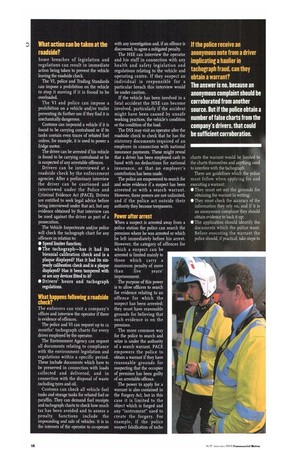What action can be taken at the roadside?
Page 18

If you've noticed an error in this article please click here to report it so we can fix it.
Some breaches of legislation and regulations can result in immediate action being taken to prevent the vehicle leaving the roadside check.
The VI, police and Trading Standards can impose a prohibition on the vehicle to stop it moving if it is found to be overloaded.
The VI and police can impose a prohibition on a vehicle and/or trailer preventing its further use if they find it is mechanically dangerous.
Customs can impound a vehicle if it is found to be carrying contraband or if its tanks contain even traces of rebated fuel unless, for example, it is used to power a fridge motor.
The driver can be arrested if his vehicle is found to be carrying contraband or he is suspected of any arrestable offences.
Drivers can be interviewed at a roadside check by the enforcement agencies. After a preliminary interview the driver can be cautioned and interviewed under the Police and Criminal Evidence Act (PACE). Drivers are entitled to seek legal advice before being interviewed under that act, but any evidence obtained by that interview can be used against the driver as part of a prosecution.
The Vehicle Inspectorate and/or police will check the tachograph chart for any offences in relation to: • Speed limiter function; • The tachograph—has it had its biennial calibration check and is a plaque displayed? Has it had its sixyearly calibration check and is a plaque displayed? Has it been tampered with or are any devices fitted to it?
• Drivers' hours and tachograph regulations.
































































































